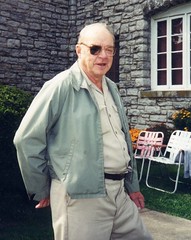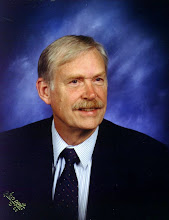

Finding a long lost cousin is usually a pleasure. Ten years ago I went to central Kentucky near Lexington, from the Los Angeles area to conduct research on my family. I had a question to ask of the man who was in charge of the Georgetown City cemetery. It is a beautiful place. He did not have the answer, but offered me a list of people who might know the answer. One on the list was a cousin I had not seen or heard of in forty-five years.
I called Horace Grover Gaines, my cousin. It took some convincing, but soon he showed up at the cemetery office to answer my questions directly. He was a big, nice looking man with an eye patch. He was definitely pirate material. Older than I by about nine years, He had been undergoing surgery on the cornea of one eye. It was clearly uncomfortable for him, but genealogy was important and I was going back to California soon. So he stayed with me and took me around town and his farm which had historical significance for several reasons.
The caretaker of the cemetery was very deferential to Horace, so I figured Horace was an important man in the community. Among other things Horace was the director of the cemetery. He was also the director of the biggest bank in town and served on the board of education, the draft board (in times past), and all sorts of community endeavors.
Horace was immensely likeable. And knowledgeable about our family in common. He had paintings of our ancestors in his home. He had records I had never imagined. But I had something for him as well: I convinced Horace that the farm he owned had been carved from the Kentucky wilderness by our common ancestors in 1783.
I felt bad because I had not known Horace longer. He was a good, intelligent man and a funny one besides. Over the next few years we corresponded often and swapped information. I wrote magazine articles based on his data and almost got the Louisville PBS station to conduct a search on his farm for signs of our Revolutionary War ancestors. But they backed out at the last minute.
I did not know Horace was a war hero, a wounded veteran of Pacific battles in WWII. I also did not know that Horace’s mind was slipping into Alzheimer’s disease. I should have suspected something because he did not remember my mother, a pretty woman whom most men did not forget.
I did get back to Georgetown a few years later with my wife. I was pleased that she got to know Horace and that we met Horace’s daughter and her children before Horace was carried away by his disease. His wife had died. He had a wonderful woman friend who helped take care of Horace until the end, which came on October 14, 2006.
I read that this nation is losing around one thousand of its WWII veterans every day. Horace was just one of those statistics. Until, that is, I set up a web page for him. It will stay on the Internet until I am another statistic.
Kentucky


No comments:
Post a Comment